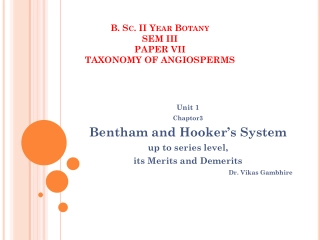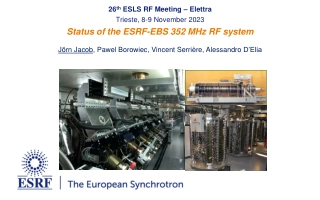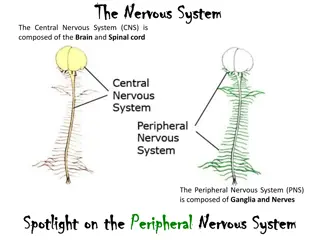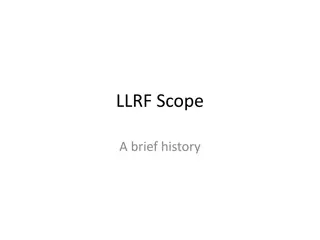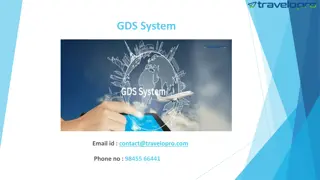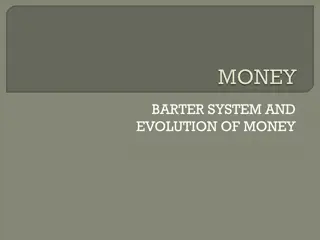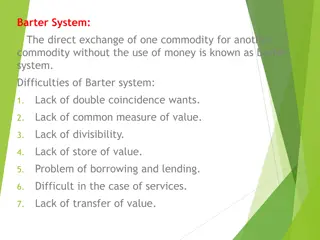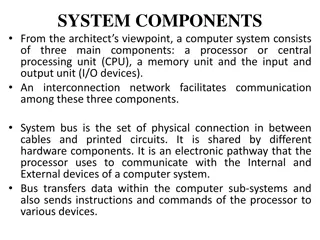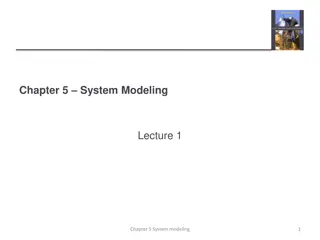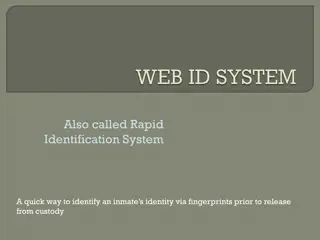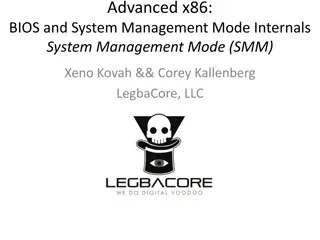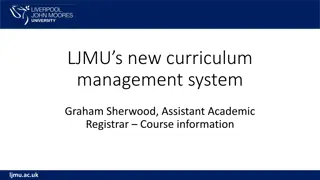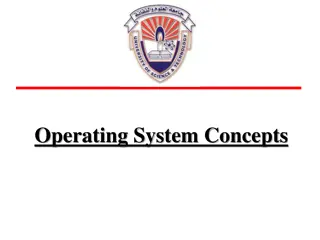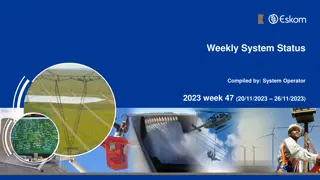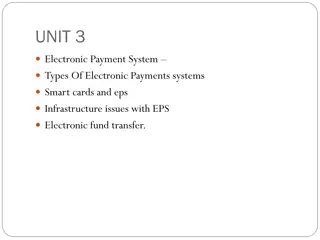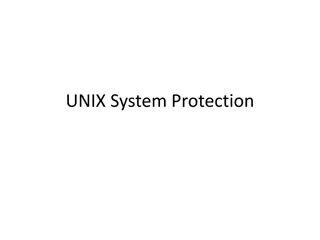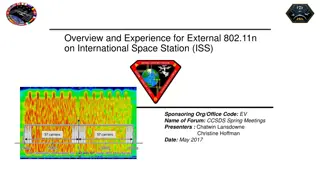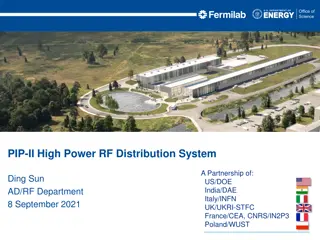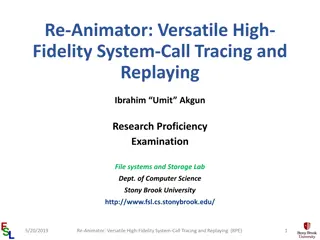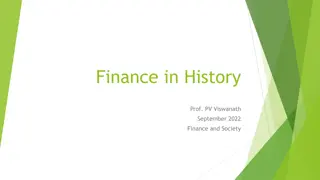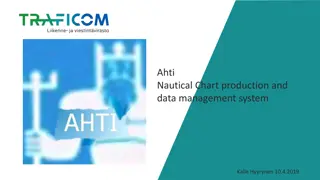Bentham and Hooker's System of Classification in Botany
Bentham and Hooker's system of classification in botany is a natural system based on a large number of characters considered simultaneously. Proposed by British taxonomists George Bentham and Joseph Dalton Hooker, this system categorizes seed plants into classes, orders, families, and genera. It is
2 views • 10 slides
Overview of ESRF-EBS 352 MHz RF System Upgrade at 26th ESL RF Meeting
The 26th ESL RF Meeting held at Elettra in Trieste discussed the status and upgrades of the ESRF-EBS 352 MHz RF system. The meeting covered topics such as the EBS RF layout, HOM damped cavities, RF ECO-Mode, ongoing RF projects, and the replacement of klystrons with SSAs for a 4th harmonic RF system
0 views • 16 slides
adonai software
Adonai college Management System is a cloud-based ERP System that delivers various College and School Management Systems, College and School Management Software, College and School Management System ERP, College and School Management Software System, Online College and School Management Software Sys
3 views • 1 slides
System Models in Software Engineering: A Comprehensive Overview
System models play a crucial role in software engineering, aiding in understanding system functionality and communicating with customers. They include context models, behavioural models, data models, object models, and more, each offering unique perspectives on the system. Different types of system
2 views • 33 slides
Understanding the Nervous System: CNS, PNS, SNS, and ANS
The nervous system comprises the Central Nervous System (CNS) and Peripheral Nervous System (PNS), with the PNS further divided into the Somatic Nervous System (SNS) and Autonomic Nervous System (ANS). The SNS controls voluntary movements of skeletal muscles, while the ANS regulates involuntary proc
2 views • 23 slides
The muscular system
The muscular system is a vital organ system that includes smooth, skeletal, and cardiac muscles. It plays a crucial role in locomotion, supporting the cardiovascular system, enabling lung ventilation, regulating fluids, maintaining posture, and generating heat in the body. This system consists of ar
2 views • 16 slides
Understanding Control Systems in Ergonomics Macro
Control systems play a vital role in regulating and managing various processes within different industries. This content delves into the fundamentals of control systems, discussing terms like input, output, plant, process, system, open-loop system, closed-loop system, transfer function, feedback con
7 views • 15 slides
Overview of LLRF Scope and Development
The LLRF system is responsible for controlling the phase and amplitude of cavities in the linac system. The cost book details the budget for implementing the LLRF system in 155 systems. Adaptations were made to the PEG for delivering and installing the LLRF systems. A schedule outlines the developme
0 views • 8 slides
GDS System
Travelopro Global Distribution System (GDS) is a computerized network system. It is a large computer network which is integrated with 100 of worldwide Airlines and consolidators for enabling transactions between travel agents and travel sites and also used by airlines, hotels, car rentals, railways
4 views • 15 slides
Economic Conditions During the Sangam Age
Agriculture was the primary occupation, with paddy and rice as main crops. Weaving, spinning, fishing, and hunting were vital industries. Trade thrived through barter initially and later coins. Local markets like Angadis and port cities like Puhar facilitated trade. Roman gold coins indicate extensi
3 views • 6 slides
Evolution of Money: From Barter to Electronic Banking
Money has evolved from the barter system to electronic banking through various stages like animal money, metallic money, paper money, and credit money. The invention of money was crucial to overcome the limitations of barter, leading to the ideal utilization of resources and solving issues like the
0 views • 14 slides
Understanding Barter System and Money: Definitions and Functions
Barter system involves direct exchange of commodities without money, facing challenges like lack of common measure of value and divisibility. Money, derived from Latin "Moneta," serves as a medium of exchange, measure of value, and store of wealth, enabling economic transactions and facilitating bor
0 views • 35 slides
Understanding the Immune System: Organs, Functions, and Importance
The immune system acts as a defense mechanism against pathogens and infections, comprising various organs, such as the bone marrow, thymus, spleen, white blood cells, antibodies, complement system, and the lymphatic system. It works to recognize and destroy harmful microbes, maintaining the body's h
1 views • 23 slides
Evolution of Land Law Systems in Trinidad and Tobago
Trinidad and Tobago's land law systems consist of the Common Law System and the Registered Land System. The Common Law system governs unregistered land where title passes upon execution and delivery of the deed. In contrast, the Registered Land System confers ownership upon registration and offers c
0 views • 28 slides
Economic Conditions During the Sangam Age
Agriculture was the main occupation with paddy as the main crop. Industries like weaving and spinning flourished producing cotton fabrics and fine garments. Fishing and hunting were important occupations, and trade was well-organized internally and externally, transitioning from barter to coin syste
0 views • 6 slides
Understanding Computer System Buses: Components and Functions
A computer system comprises three main components - the CPU, memory unit, and I/O devices connected via an interconnection network, facilitated by the system bus. System buses reduce communication pathways, enabling high-speed data transfer and synchronization between components. Internal buses conn
3 views • 55 slides
Understanding System Modeling in Engineering
System modeling in engineering involves developing abstract models to represent a system from various perspectives using graphical notations like UML. These models aid in understanding system functionality, communicating with stakeholders, and documenting requirements for new systems. Existing and p
2 views • 53 slides
Rapid Identification System for Inmate Release
The Rapid Identification System, also called Rapid ID System, provides a quick way to verify an inmate's identity using fingerprints before release from custody. It allows law enforcement agencies, including IPD users under SDSheriff, to log in and access the system. By searching the San Diego AFIS
3 views • 8 slides
Understanding System Management Mode (SMM) in x86 Processors
System Management Mode (SMM) is a highly privileged mode in x86 processors that provides an isolated environment for critical system operations like power management and hardware control. When the processor enters SMM, it suspends all other tasks and runs proprietary OEM code. Protecting SMM is cruc
1 views • 26 slides
Revolutionizing Paper Mill Operations with AutoRate System by P.L.C
AutoRate system by P.L.C offers a superior alternative to manual feed rate control in paper mills, addressing issues of operator variability and inconsistent system responses. By utilizing a Virtual Controller based on inherent system values, the system enhances overall consistency and efficiency, r
2 views • 12 slides
Evolution of Money and Drawbacks of Barter System in Economics
Money's role in facilitating economic exchanges and overcoming the limitations of the barter system are key topics covered in this presentation. Discusses the significance of money, the challenges of barter such as lack of double coincidence of wants, absence of common measure of value, and issues w
0 views • 11 slides
Understanding Profit and Loss in Business Transactions
Learn about cost price, selling price, profit, loss, profit percentage, loss percentage, marked price, discount, successive discount, goods and services tax. Explore the historical context of profit and loss statements from the barter system to modern business transactions. Practice calculating prof
0 views • 31 slides
Economic Development During Pandya Period
Agriculture, industry, trade, and commerce played crucial roles in the economic growth of the Pandya period. The state focused on improving irrigation facilities, leading to flourishing trade and commerce. Agriculture was the primary occupation, with lands divided into different categories. Industri
0 views • 10 slides
Evolution of Money: From Barter System to Currency Exchange
Explore the transition from barter system to the introduction of money in economic exchanges. Learn about the challenges of barter trade such as lack of double coincidence of wants, absence of a common measure of value, and issues with future payments, leading to the development of money as a medium
0 views • 11 slides
LJMU's New Curriculum Management System Project Overview
LJMU's new curriculum management system project aims to streamline course information production and storage by implementing the Courseloop system. The project timeline includes releases for data governance, migration, testing, and training leading up to the system's go-live in September 2022. The p
1 views • 8 slides
Understanding Operating System Concepts: Lecture Overview and Services
Exploring the lecture content on operating system concepts, structures, services, system calls, and file manipulation. Delve into the importance of operating system services, error detection, program execution, I/O operations, protection, security, and resource allocation in operating systems. Learn
4 views • 26 slides
System Sequence Diagrams: Understanding Artifact for System Behavior
System Sequence Diagrams (SSDs) are vital artifacts that visually illustrate input and output events related to a system. They help define system behavior and interactions, making them essential during the logical design phase of software applications. By depicting events in sequential order, SSDs o
2 views • 24 slides
Weekly System Status Update: Adequacy of National Electricity Supply (Week 47, 2023)
This weekly system status report compiled by the System Operator provides insights into the National Electricity Supply System's adequacy in the medium term. It includes data on historic daily peak system capacity/demand, available dispatchable generation, operating reserve margin, forecast vs. actu
1 views • 14 slides
Evolution of Electronic Payment Systems: From Barter to Cryptocurrencies
The evolution of payment systems has come a long way, from the barter system in ancient times to the modern era of cryptocurrencies and digital payments. This journey includes the invention of coins, paper money, banknotes, cheques, credit cards, and the latest digital payment methods. The impact of
0 views • 24 slides
Overview of UNIX System Protection
UNIX System Protection focuses on ensuring security and access control mechanisms within the UNIX operating system. Developed in 1969 by Dennis Ritchie and Ken Thompson at AT&T Bell Labs, UNIX features design elements like a portable API, protection rings, kernel processes, and a trusted computing b
0 views • 12 slides
Factors Affecting Terms of Trade in International Economics
Terms of Trade (TOT) in international economics represent the ratio between a country's export prices and its import prices, influencing its trade balance. Various types of TOT include Net Barter, Gross Barter, Income, Single Factoral, Double Factoral, Real Costs, and Utility terms. Major factors im
0 views • 4 slides
Spartan Economy and Society: A Closer Look
The Spartan economy was characterized by strict state control, limited property rights, and a focus on meeting basic needs through a barter system. Land ownership reforms aimed to address wealth inequality, providing each citizen with an equal share of land. While the system promoted stability and v
0 views • 9 slides
Overview of External Wireless Communication System on International Space Station (ISS)
This presentation covers the overview and experience of implementing an external 802.11n wireless communication system on the International Space Station (ISS). It discusses the existing wireless system, committed users, system architecture, and future challenges. The system provides high data rate
0 views • 18 slides
Evolution of Money: From Barter to Fiat Currency
The evolution of money traces back to barter economies where a mutual coincidence of wants was necessary for trade. Settlers in Colonial America used commodity money and fiat money, with specie coins becoming popular due to their mineral content. The term "dollars" originated from the German pronunc
0 views • 60 slides
PIP-II High Power RF Distribution System Overview
The PIP-II High Power RF Distribution System is a collaborative project involving various countries and institutions to develop a sophisticated system capable of efficiently distributing RF power to superconducting cavities. The system consists of multiple distribution lines and components designed
0 views • 28 slides
Long-Baseline Neutrino Facility (LBNF) Primary Beamline LCW System Overview
The Long-Baseline Neutrino Facility (LBNF) Primary Beamline Low Conductivity Water (LCW) System comprises various technical design aspects including system operational scope, major system updates, design requirements, and component summary. It involves the provision of LCW cooling for magnets and po
0 views • 14 slides
Re-Animator: Versatile System Call Tracing and Replaying
Re-Animator is a research project focusing on creating a high-fidelity system call capturing system with minimized overheads. The project aims to capture long-running applications and provide scalable and verifiable system call replaying. It introduces two prototype system call tracing systems and h
0 views • 39 slides
Strategies for Enhancing Extended Producer Responsibility System in Bulgaria
Korea-Bulgaria Knowledge Sharing Program focused on sharing strategies to enhance Bulgaria's Extended Producer Responsibility (EPR) system. The program discusses the current status, performance evaluation, issues, and recommendations related to the EPR system in Korea. It covers topics like beverage
0 views • 38 slides
Evolution of Money: From Barter to Coins in Ancient Civilizations
In ancient Mesopotamia and China, various commodities like barley, metals, and cowries were used as currencies before the emergence of standardized coinage. Control over the money supply became essential for political authority, leading to the minting of coins. The surplus production in societies al
0 views • 10 slides
Ahti Nautical Chart Production and Data Management System Overview
Ahti Nautical Chart Production and Data Management System, led by Kalle Hyyrynen, aims to modernize nautical chart production by utilizing standardized products, improving system technology, and enhancing data management. The project addresses challenges such as outdated technology, integration need
0 views • 7 slides
